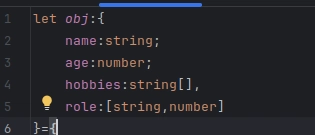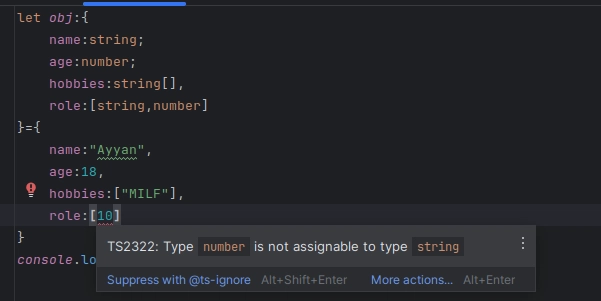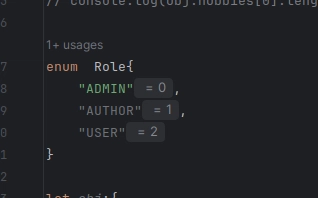Basic Types
number : It includes all numbers like int float etc
string : All of the strings data
boolean: Only true and false , not truthy and falsy value
function add(n1:number,n2:number){
console.log(n1+n2)
}
const number1=5
const number2=9.5
add(number1,number2)
function add(n1,n2){
if(typeof n1!=="number"||typeof n2!=="number"){
throw new Error("Invalid type")
}
console.log(n1+n2)
}
const number1=5
const number2=9.5
add(number1,number2)
💡 Important Type Casing
In Typescript, you work with types like string or number all the times.
Important: It is string and number (etc.), NOT String, Number etc.
Boolean
function add(n1:number,n2:number,showResult:boolean){
if(showResult){
console.log(n1+n2)}
else{
return n1+n2
}
}
const number1=5
const number2=9.5
const printResult=true
add(number1,number2,printResult)
String
function add(n1:number,n2:number,showResult:boolean,phrase:string){
let ans=n1+n2
if(showResult){
console.log(phrase+ans)}
else{
return ans
}
}
const number1=5
const number2=9.5
const printResult=true
const showPhrase="Hello"
add(number1,number2,printResult,showPhrase)
Typescript Inference
- Typescript Inference helps the Typescript compiler to infer its type automatically
Example:
let number=5
Above code the typescript will infer as number as number because we assigned it a value during it’s initialization
const number=5
Only diff in let and const is that const will assign 5 as specific number type and let will just assign number as type
- You should ddeclare a type only if you are not assigning a value
Example:
let number;
number="Ayyan"
Above the variable is declare without any initialized value , So here you have to otherwise any value will be added like string
let number:number
number=8
Objects in Typescript
The objects can be typed in by using object type lIke
let obj:object ={name:"Ayyan",age:19}
But this is not the good way of creating the objects, The correct way is to create a correct structure with predetermining the properties types of object
Example :
let obj:{name:string; age:number;}={name:"Ayyan",age:18}
console.log(obj.name)
💡 It is recommended to let typescript infer it not by specifying
Of course object types can also be created for nested objects.
Let's say you have this JavaScript object:
1. const product = {
2. id: 'abc1',
3. price: 12.99,
4. tags: ['great-offer', 'hot-and-new'],
5. details: {
6. title: 'Red Carpet',
7. description: 'A great carpet - almost brand-new!'
8. }
9. }
This would be the **type** of such an object:
1. {
2. id: string;
3. price: number;
4. tags: string[];
5. details: {
6. title: string;
7. description: string;
8. }
9. }
So you have an object type in an object type so to say.
Arrays
We can add types for Arrays
For Example :
let obj:{name:string; age:number; hobbies:string[]}={name:"Ayyan",age:18,hobbies:["Sports"]}
console.log(obj.name)
🎯 Tuples
Tuples are new datatype introduced in Typescript with this
- We can
fixthe length of array and -
We can take heterogeneous data means in same array both
number,strings,booleanetcExample: Here with role we have two types in array
stringandnumber
-
We can state the the positon of index of that types which type should be taken where
Example: Above
stringat index0so we cannot add any other datatype same for index1withnumbertype other wise it will throw error
🎯 Enums
The Enums are enumerated global constant identifiers which are used to declare a global variable, The enum property type can create a variable for you and automatically assign a number to it ,It’s syntax is
enum <name>{
"A",
"B",
"C"
}
They are assigned with a number in increment oreder like
You can even add your custom number in begining it will automatically increment further
or you can give your custom input
enum <name>{
"A"=100,
"B"="Ayyan",
"C"=true
}
Any type
Any as it’s name suggest can take any value irrespective ,For example
let number:any
//Assign number to it
number=10
//Assign string to it
number="Ayyan"
//Assign boolean
number=true
If you have array you can define any as any[] so at-least it can check for array
💡 Avoid using any in any circumstance as it take away properties for which we are using typescript
🎯 Union Type
The Union type provides us with flexibility by assigning one type to variable
Syntax :
let input:number|string
let input1:number|string|boolean
let input2:number|string[]
You can combine any Types based on your logic required , it uses | operator yo combine them
Example:
function combine(input1:number|string,input2:number|string){
if(typeof input1==="number"&& typeof input2==="number"){
return input1 + input2
}else {
return input1.toString() + input2.toString()
}
}
let numInput=combine(1,978)
let strInput=combine("Ayyan","Shaikh")
console.log(numInput)
console.log(strInput)
🎯Literal Types
Literal types are types you assign declaration,Example
const number=5
//Here 5 will be a literal type as const is used with it , so typescript will infer is type as number 5
//Union with literal types
function combine(input1, input2, conversion) {
if (conversion === "as-number") {
if (typeof input1 === "number" && typeof input2 === "number") {
return input1 + input2;
}
}
else {
return input1.toString() + input2.toString();
}
}
let numInput = combine(1, 978, "as-number");
let strInput = combine("Ayyan", "Shaikh", "as-text");
console.log(numInput);
console.log(strInput);
🎯 Type aliases
The type alias is mostly used to combine two or more types or creating your custom type ,It’s syntax is
Syntax:
type <any_name> =number|string
type <any_name1> =number|string|boolean
type <any_name2> ="Ayyan"|"Saffan"//literal types
type <any_name3> =string[]|number[]|number //Array types
You can combine any inbuilt type and create you custom type and assign it
Example:
type Combinable=string|number
function combine(input1:Combinable,input2:Combinable,conversion:"as-text"|"as-number"){
if(conversion==="as-number"){
if(typeof input1==="number"&& typeof input2==="number"){
return input1 + input2
}}else {
return input1.toString() + input2.toString()
}
}
let numInput=combine(1,978,"as-number")
let strInput=combine("Ayyan","Shaikh","as-text")
console.log(numInput)
console.log(strInput)
Type Aliases & Object Types
Type aliases can be used to "create" your own types. You're not limited to
storing union types though - you can also provide an alias to a
(possibly complex) object type.
For example:
1. type User = { name: string; age: number };
2. const u1: User = { name: 'Max', age: 30 }; // this works!
This allows you to avoid unnecessary repetition and manage types centrally.
For example, you can simplify this code:
1. function greet(user: { name: string; age: number }) {
2. console.log('Hi, I am ' + user.name);
3. }
4.
5. function isOlder(user: { name: string; age: number }, checkAge: number) {
6. return checkAge > user.age;
7. }
To
1. type User = { name: string; age: number };
2.
3. function greet(user: User) {
4. console.log('Hi, I am ' + user.name);
5. }
6.
7. function isOlder(user: User, checkAge: number) {
8. return checkAge > user.age;
9. }
🎯 Functions Type Check
In functions we can also type check everything as you have seen before parameters are given types just like that we can give types to function return type like what value it will return
Example
// Here this function will return ⬇️ number so
function add(n1:number,n2:number):number{
return n1+n2
}
const number1=5
const number2=9.5
const output=add(number1,number2)
console.log(output)
void return type
The void return type is used when you don’t return any thing in a function
// Here this function will return ⬇️ void because we are not returning anything
function add(n1:number,n2:number):void{
console.log(n1+n2)
}
add(number1,number2)
void and undefined is same but in function typescript make a distinction ,In above code if you will use :undefined it will give error but if you will add empty return it will not give error
🎯 Function Types II
Function types are types that describe a function regarding the parameters and the return value of that function.
A function type is created with this arrow function notation you know from JavaScript or at least close to that notation.You don't add curly braces here because we aren't creating an arrow function here, we are creating a function type instead.Now on the right side of this arrow,you specify the return type of the function you eventually want to be able to store in here.
Example
function add(n1:number,n2:number):number{
return n1+n2
}
function printResult(num:number){
console.log(`Result is ${num}`)
}
let combineValues:(num1:number,num2:number)=>number
combineValues=add
const number1=5
const number2=9.
combineValues(number1,number2)
Now combineValues will only take the function which matches (num1:number,num2:number)=>number
Otherwise it will give error
Callback Function Types
As function types also we can create types for callback function as same
function add(num1:number,num2:number,cb:(num3:number)=>void){//Here void means not to check for anything in return type
const result=num1+num2
cb(result)
}
function printResult(num:number){
console.log(`Result is ${num}`)
}
const number1=5
const number2=9.
add(number1,number2,printResult)
Unknown type
unknown.unknown is the type-safe counterpart of any.
Anything is assignable to unknown, but unknown isn’t assignable to anything but itself and any without a type assertion or a control flow based narrowing.
Likewise, no operations are permitted on an unknown without first asserting or narrowing to a more specific type. We have to check every-time before assigning a unknown
Example:
let userInput:unknown
let userName:string
userInput=userName //We can assign other type to unknown
//But
userName=userInput ❌//We cant do that it gives error
//To do it correctly we have to assert it like
if(typeof userInput==="string){
username=userInput
}
//Now it will not give error ✅
Never Type
In Typescript when we are certain that a particular situation will never happen, we use the never type. For example, suppose you construct a function that never returns or always throws an exception then we can use the never type on that function. Never is a new type in Typescript that denotes values that will never be encountered.
Example 1: The null can
be assigned to void but null cannot be assigned to never type variables,
nor can any other type be assigned including any.
function generateError(message:string,code:number){
throw {message,code}
} //This function will never return any value
Confusion with void
As soon as someone tells you that never is returned when a function never exits gracefully you intuitively want to think of it as the same as void. However, void is a Unit. never is a falsum.
A function that returns nothing returns a Unit void. However, a function that never returns (or always throws) returns never. void is something that can be assigned (without strictNullChecking) but never can never be assigned to anything other than never.
Use case of never
Mostly to give detail about function whether it can return or not something








Top comments (0)